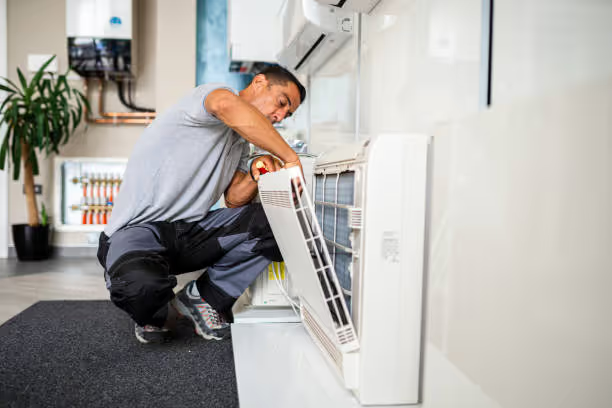Furnace Maintenance in Glen Cove, NY
Keeping your furnace well-maintained is one of the smartest investments you can make for comfort, safety, and lower heating costs in Glen Cove, NY. Regular furnace maintenance prevents breakdowns during cold snaps, preserves efficiency, and extends equipment life. For homeowners on the North Shore of Long Island—where winters can be chilly, damp, and influenced by salt air—seasonal tune-ups and targeted inspections are especially important to protect aging equipment and maintain steady, safe heat.

Why furnace maintenance matters in Glen Cove
Glen Cove homes face a few regional factors that change how furnaces age and perform:
- Coastal humidity and salt exposure can accelerate corrosion on exterior vents, flues, and some furnace components.
- Cold, damp winters increase run-time and stress on systems compared with milder climates.
- Many properties in Glen Cove are older, with original ductwork or mixed heating systems that benefit from careful inspection and balancing.
Routine maintenance addresses those conditions directly, preventing rust-related failures, ensuring safe venting, and keeping efficiency from dropping as seals and controls age.
Common furnace maintenance issues in Glen Cove
Homeowners typically schedule maintenance because of these recurring problems:
- Reduced airflow due to clogged filters or duct leaks
- Rising energy bills from dirty burners, restricted airflow, or failing controls
- Uneven heating and cold spots from unbalanced ducts or failing blower motors
- Noisy operation caused by loose components, misaligned belts, or failing bearings
- Yellow pilot light or unusual exhaust color, indicating combustion or venting problems
- Corrosion on flue pipes or exterior vents from salt air exposure
Addressing these issues proactively through seasonal maintenance avoids emergency repairs and improves safety.
What a seasonal furnace tune-up includes
A professional seasonal tune-up is a thorough inspection and adjustment of key furnace systems. Typical steps performed during maintenance:
- System start-up and full operational test - observe startup sequence, cycling, and thermostat response.
- Safety inspection - check heat exchanger for cracks, test combustion safety controls, inspect flue and venting for blockages or corrosion, and verify proper carbon monoxide safeguards.
- Burner and combustion check - clean burners, verify proper ignition and flame pattern, and adjust fuel/air mixture for efficient combustion.
- Filter assessment and recommendations - inspect filter type and condition; recommend replacement frequency and appropriate MERV level for indoor air quality needs.
- Blower and motor service - clean blower blades, inspect motor bearings, lubricate where applicable, and test blower operation and amperage draw.
- Electrical and control inspection - tighten electrical connections, test relays, capacitors, safety switches, and thermostat communications.
- Heat exchanger visual and functional check - visually inspect for cracks or corrosion and confirm proper temperature rise through the system.
- Ductwork and airflow review - spot-check ducts for visible leaks, disconnected sections, and insulation gaps that reduce efficiency.
- Documented findings and recommendations - provide a clear summary of condition, any recommended repairs, and prioritized next steps.
Technicians tailor the tune-up based on whether the system is natural gas, oil, or an alternative heating source like a heat pump.
Filter replacement and indoor air quality
Filters are the simplest and most effective way to protect equipment and improve indoor air. Practical guidance:
- Standard fiberglass filters: replace monthly during heavy-use months.
- Pleated filters (higher MERV): replace every 2-3 months, or more often for homes with pets, allergies, or high dust.
- High-MERV or HEPA systems: ensure your furnace blower is rated for higher-resistance filters before moving to very high MERV values.Regular filter changes reduce strain on the blower, improve heat transfer, and cut dust buildup on heat exchangers and burners.
Safety checks you should never skip
A key reason for professional maintenance is safety. Critical checks include:
- Heat exchanger inspection for cracks that can allow combustion gases into the living space
- Venting and flue integrity, especially important near salt-exposed exteriors where corrosion can create leaks
- Proper combustion and exhaust color/pattern to identify incomplete combustion or carbon monoxide risks
- Gas line and connection checks for leaks and proper shutoff operationThese checks reduce health risks and address conditions that routine replacement of parts alone will not solve.
Benefits of a furnace maintenance plan or service agreement
Maintenance plans add structure and long-term value:
- Scheduled seasonal tune-ups to keep service on a predictable calendar
- Priority scheduling during high-demand cold periods
- Consistent, documented inspections that support warranty requirements and prolong equipment life
- Discounted diagnostic or repair rates for covered members
- Peace of mind from knowing systems are inspected by trained technicians familiar with local conditions
For Glen Cove homes, a maintenance agreement helps track corrosion-prone components, manage ductwork aging, and ensure timely adjustments before coastal weather worsens problems.
Signs you need immediate attention
If you notice any of these symptoms, arrange for a maintenance inspection promptly:
- Sudden spike in heating costs
- Frequent on-off cycling or short cycling
- Strange odors during operation or a yellow (rather than steady blue) burner flame
- Unusual banging, rattling, or grinding noises
- Visible rust or damage around exhaust vents or the heat exchanger area
- Carbon monoxide detector alarms or unexplained symptoms among occupants
Prompt maintenance prevents small issues from turning into costly failures and addresses safety concerns quickly.
Long-term value: reliability, efficiency, and equipment life
Regular furnace maintenance delivers measurable benefits:
- Improved efficiency means lower energy use and more even heating
- Fewer unexpected breakdowns and reduced emergency repair frequency
- Extended service life of the furnace and associated components
- Better indoor air quality and a safer home environment
- Predictable budgeting through planned maintenance intervals and documented system histories
For homeowners in Glen Cove, where seasonal weather and coastal factors amplify wear, routine maintenance is the best defense against premature replacement and unnecessary disruptions.
Summary
Furnace maintenance in Glen Cove, NY protects comfort, safety, and household budgets. A professional seasonal tune-up includes safety inspections, burner and heat exchanger checks, filter guidance, lubrication, and electrical testing to keep your system running reliably through coastal winters. Maintenance plans provide structured care, priority service, and documented inspections that matter for both daily comfort and long-term equipment health. If you want reliable heat, lower energy use, and the assurance that your system is safe and efficient, consistent maintenance is essential.
Customer Testimonials
Hear directly from homeowners who trust Bobby O’s HVAC Inc. for fast response times, honest service, and lasting comfort.











